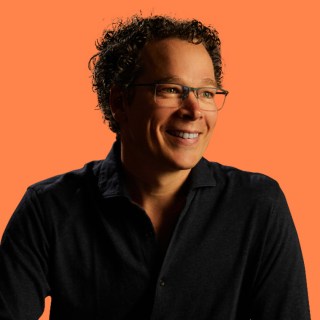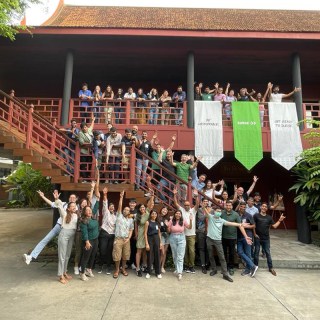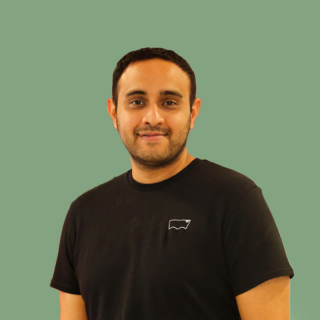Telio (Surge 01 2019) connects the mom-and-pop shops in Vietnam with brands and wholesalers on a centralized platform that delivers more choice, better pricing and more efficient logistics through economies of scale. Aakash Kapoor talked with Sy Phong Bui about his startup journey, his unique approach to ESOP -- and the sharp, upward trajectory Telio has been tracking since March 2019 – at a fireside session during Week One of Surge 02 2019.
Telio (Surge 01 2019) connects the mom-and-pop shops, which form the backbone of Vietnam’s large, unorganized retail sector, with brands and wholesalers on a centralized platform that delivers more choice, better pricing and more efficient logistics through economies of scale. Telio’s founder Sy Phong Bui, who has 10 years of experience across telcos and banks in France and Vietnam, founded two startups – BonBonHub, a P2P car rental platform, and OnOnPay, an e-wallet startup — before starting Telio in November 2018. His core, executive team has worked with him for several years. Surge’s Aakash Kapoor talked with Sy Phong about his startup journey, his unique approach to ESOP — and the sharp, upward trajectory Telio has been tracking since March 2019 – at a fireside session during Week One of Surge 02 2019. Here’s an excerpt of their conversation.
Aakash: Telio is your third startup. Can you talk a little on how you came up with the idea for Telio – and what key insight you’d share with other founders who are starting up for the first time?
Sy Phong: We were running our e-wallet startup when the idea came up for Telio. The e-wallet was not gaining much traction. Vietnamese consumers simply still prefer cash, and we had to launch an aggressive campaign to onboard both consumers and retailers. It was on a visit to see retailers that I started thinking about Telio. I stopped into one of the many small shops that sell drinks, snacks and daily necessities, which you see all over Vietnam, and started talking with the owner. She was a single mom, and I saw the challenges she faced – ordering goods, managing her stock, dealing with all these different suppliers – and how much time she spent on all of this, I could see there was a real problem that affected many small retailers that we could help solve. Vietnam’s retail sector is large and very fragmented, and the B2B space is quite empty.
That was a real mindset change for us. My first two businesses were businesses that we wanted to do. The key learning is that you have to build a product the customer actually wants.
Aakash: Your vision is to empower small businesses through technology. Can you dig a little into the problem you’re trying to solve?
Sy Phong: We’re trying to solve three related problems. The first is around the country’s fragmented inventory supply chain. Retailers in these small shops sell a lot of different items and have to contact 50 to 80 different wholesalers or distributors to manage supply. The second issue we want to solve is the lack of transparency on pricing, quality and even availability of these products. Since the market is so fragmented, retailers don’t have a clear view of any of these things. The third is around inventory. Most retailers have to wait five to seven days for delivery or go pick it up themselves. This is not convenient at all. A lot of working capital gets stuck in inventory.
Our solution is an easy to use central platform that connects sellers and retailers, removes multiple contact points and provides full transparency on pricing, product quality and availability. They can do all of this through our app on a smart phone. We also provide next-day delivery, which helps the retailers a lot in terms of better management of their shop, and their liquidity.
Aakash: When we first met, you had about 100 merchants on your platform. You’re now working with over 2,000 merchants – and Telio’s sales have grown more than 100 times in that short period. What’s happened in the last six months?
Sy Phong: It’s been an incredible journey since March 2019, and I think it’s due to three key levers.
First, we had a committed team, and we – as a team – committed to the right product. Second, the high growth that’s followed proved we had the right business model and the right market fit. And the third lever was the strong support from Surge. I don’t just mean the financial support. We’ve had so much support and direction from Roy (Sequoia’s CTO) and the Surge talent team on building up our IT team – Roy helped us hire over 30 engineers. And all the help on the business model, too. When we first started, we thought about focusing on distribution of MNC products and brands. During the working sessions we had with you and Shailendra, we realized there’s a much bigger opportunity – and during those discussions we started to define the marketplace model and all the verticals we can grow in.
I learned a lot from all the Surge sessions and the exposure to knowledge. In Bangalore, for example, we learned how to build a strong technical platform; in Singapore, we learned how to build a strong culture, which is very important, and a company structure to maintain high growth. In China, I really took a lot away from the session from OYO on how to scale the business faster.
Aakash: During Surge, the group spent a lot of time talking about ESOP, and why it’s important to carve out a sizeable share for employees. Telio has taken a very unique approach and has set the bar on many levels. We also spent time chatting about this in the lead up to Surge. How do you think about employee equity, and how has your strategy changed?
Sy Phong: The core people on the team were with me for a long time, and they’ve gone through many tough moments together with me. To live through something that failed, then to start all over again builds deep bonds. That’s when you understand the importance of your colleagues, of partnership, of staying tight. That’s why I believe the company should belong to everybody, not just me. So, with Telio, we reserved a very large ESOP pool – 20% of the company. Then you and I had another conversation about the core team. I remember on that call, you said “This is going to be a big business, and we have to have a long view. And being generous with the founding team, with the people you want to be with the company for a very long time, is very important.” I talked it over with my team, and when you called the next day, I let you know I wanted to allocate an additional 25% to the core team from my shares. I am glad we had a chat that day. This leadership team is going to help build this company, and they should be rewarded and motivated for all their hard work.
Aakash: It was very inspiring! We always encourage founders to set aside a large ESOP pool. You went above and beyond by carving out 45% of the company for your employees. We liked that you think of your key, executive team as co-founders. It’s a long-term view.
You’re a real trailblazer in Vietnam, on many fronts. What is your vision and long-term plan for Telio?
Sy Phong: Our mission is to empower the large, underserved population of small retailers in Vietnam. Our vision is to become the largest B2B platform in the country. And we have an ambition to become a unicorn – not just about valuation. But, in each and every action we do, I want to become the unicorn of impact. So, all the orders we deliver have impact, the value we create has impact, all the jobs we create have impact. We want to try to create a plus-billion dollar impact on our economy.









